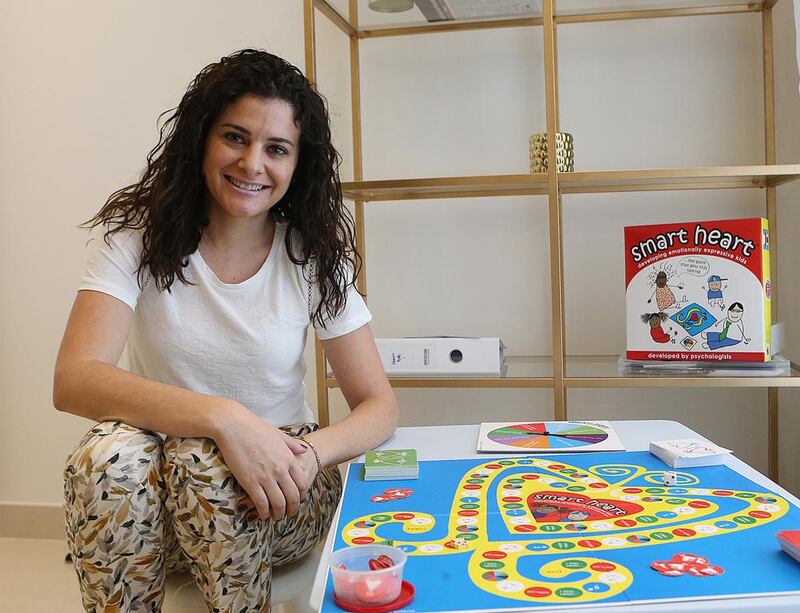The creator of a family board game that allows young children to constructively express their feelings without fear is calling on schools to introduce emotional intelligence curriculum options to assist parents in raising their children.
Psychologist Christine Kritzas is one of the creators, the Smart Heart board game.
The South African expat moved to Dubai last month to work with the team at The LightHouse Arabia Centre for Wellbeing, where she helps to teach the concept of play therapy to families who are struggling to get through to distressed children.
“In my opinion, children aren’t born with the skill of being expressive, so this needs to be a subject taught in schools,” says the 32-year-old Kritzas, adding that games provide a non-threatening environment that allows self-expression. “Unlike adults, children do not have the means to express themselves. Children can’t sit on a couch and discuss what is bugging them, so play therapy is a way for children to communicate how they are feeling.”
A few years ago Kritzas decided to create a board game that would help therapists and parents open a healthy line of communication with their children without intimidating them. She collaborated with clinical psychologist Janet Bytheway to address the most pressing emotional issues they had come across in their combined 23 years of counselling and the end result is the Smart Heart board game, which was launched in 2013.
“The board game is a parent’s window into a child’s world and creates a platform for meaningful conversation between them and their children,” says Kritzas.
“It’s also quality time that they get to spend with their children and know what is happening in the classroom, playground – and even what might be troubling them at home.
“The game doesn’t replace the need for a therapist but it does help, and can be a starting point for parents to understand what is going on.”
Designed for children between the ages of 5 and 13, the game requires players to collect tokens to progress and are prompted to share their feelings and daily experiences through play cards. These include “Talk-Talk”, which asks them to answer social, personal and moral development questions such as why is it important to share your toys, and what do you worry about the most?
“These cards can also be a way for parents to teach morals and values in a way that the children do not feel like they are being lectured,” she says.
There are also 50 “I feel … when …” cards that are aimed at broadening children's emotional vocabulary, which also encourages them to discuss and take ownership of their feelings.
“So if a child gets an ‘angry’ card, they are asked to talk about why they feel angry, but also link it to when they feel that way,” says Kritzas. “For a child to be able to express their feelings is one level of emotional intelligence, but if they can express what and when that feeling creeps up on them, that is taking it up a notch.”
A Pic-Tales element of the game encourages them to describe what they see on the card or relate the picture to an incident in their life.
“If a child narrates an incident that affected them, then parents can take that opportunity to collaborate and find solutions for the next time it happens,” says Kritzas. “We wanted to make the game as simple as possible so that even children younger than five could get involved.
“If parents get involved and share their experiences, they can teach their children appropriate emotions and resilience in difficult situations.”
A 2011 study of 17,000 British infants observed over a 50-year period concluded that a child’s mental well-being was an indicator of their future success. Research has also found that kids who develop emotional intelligence are less depressed and anxious, earn higher grades and make healthier life choices.
Kritzas says that spending quality time away from technology is key to the process too.
“That’s why playing board games, of any kind for that matter, is a great bonding time,” she says. “It’s one-on-one time where you make positive eye contact, get down to their level physically and teach them about turn-taking, sharing and losing. You also get to see their tolerance and frustration.”
Shereen Hasan, from the United Kingdom, recently bought the Smart Heart game to play with her 7-year-old son and 3-year-old daughter. “My son is very expressive, and his favourite cards were the ‘I feel …’ ones, whereas my daughter liked describing the pictures. It’s a fun way to get the whole family to express different emotions in a playful setting.”
• Christine Kritzas is a counselling psychologist at The Lighthouse Arabia Centre for Wellbeing in Dubai. Visit www.lighthousearabia.com. To buy the game, visit www.smartheartboardgame.com
aahmed@thenational.ae





